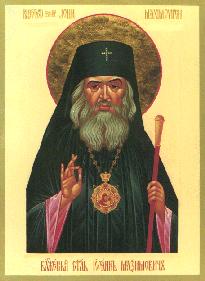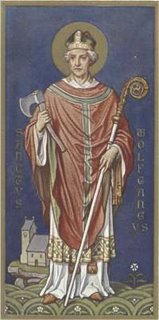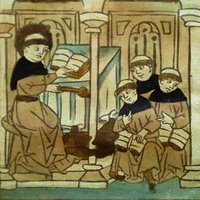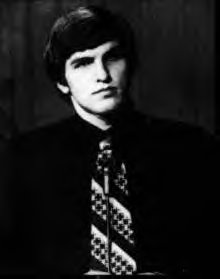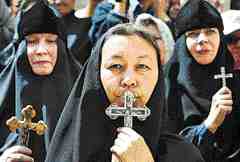
I think a lot of people in the Orthodox world, although they acknowledge the pre-schism Orthodoxy of the West, are content with importing specifically Eastern Christian things into modern Western Orthodoxy (meaning, in this case, Orthodoxy in the West) --Eastern Rites, the Philokalia, Byzantine chant. And, with these things, many Western converts become "Easternized." They gravitate more toward St. John Climacus rather than St. Benedict, for example. Not that this is wrong, it just seems strange to me.
I chant in a Byzantine style, I celebrate the feasts of Eastern Saints with Eastern liturgics, and yet I'm a product of Western culture, a descendant of Western Christians whose long-ago ancestors were Orthodox Christians who used Western Rites and Gregorian Chant, went on pilgrimages to Einsiedeln, Compostela, and Tours, blessed themselves with Holy Water, prayed in Latin, and fraternized with Benedictines. Their blood flows in my veins and their ideas still flow through Western culture, albeit obscured by godlessness as silt clouds a once pristine lake or river.
In sermons, I hear about the decrepitude of American/Western culture and how I should conform my life to the Church. That's all well and good because the Church is universal and its culture transcends all others. But at times it doesn't seem like my Church, while giving me, the individual, life and purity, is working very hard to heal my Western culture, to remove that which has polluted it, to cure its hurts and correct its thoughts. Sometimes it seems as if my Church would rather my Western culture be replaced entirely with something of a more singularly "Eastern" flavor.
The Orthodox Church, it seems today, wants to preserve itself as "Eastern," and so is not concerned with rediscovery of its Western past, traditions, and outlook. Sure, some books have been written about Western Orthodox Saints, and some jurisdictions have Western Rites blessed for use (albeit the users of these Rites are numerically miniscule and their practices are, wrongly, looked down upon by other Orthodox), but, as modern Orthodoxy has lived in the West for over a century, it only seems like Western converts are becoming more "Eastern" in their expression of Orthodoxy. Instead of a rediscovery of a lost Western heritage, converts mostly rush into the "Eastern" side of things, even to the point of viewing Orthodoxy as an Eastern religion, ignoring or being ignorant of Orthodoxy's Western heritage and Western incarnation. Some Orthodox even view the Western inheritance as something lost, mysterious, unknowable, or, worse, tainted by heretical trends like the Filioque or St. Augustine's theological mistakes.
This is a real shame. If the Orthodox Church in the West remains exclusively or predominately "Eastern" in its expression of Christian culture, I don't think it will outgrow its foreigness and exoticism enough to become for modern Westerners what it was for ancient Westerners--simply, the Church of Christ. True, real mission work is not about numbers, but it's also not just about the conversion of the individual. Classical Orthodox mission work has always focused on the society, the culture. Make the culture Orthodox, and it will support the people for generations. Westerners becoming Orthodox do not stop being Western culturally. Such a thing would be impossible. However, the current trend is that they are becoming Eastern in their spiritual and religious culture. Thus, what they have to offer by word and example to their non-Orthodox Western brethren, is a praxis which is foreign to Western culture because it did not develop in Western culture. Therefore, fellow Westerners will not necessarily recognize it as being something in which they can take part in a natural, familiar way. Orthodoxy does, however, have a particular Western praxis which developed in the Western cultural milieu. While it is Orthodox and Christian (and, thus, still strange to many Westerners), it is fundamentally familiar, and non-Orthodox Westerners will be able to view it as something which belongs to them.
There are a few things to keep in mind. 1). The Western Orthodox praxis is not a carbon copy of the Eastern Orthodox praxis. 2). It did not die in the East-West schism. 3). There's no manual on how to construct it. Just like with the Eastern praxis (unless someone is affecting it), it is intuitive and experiential and recognizable as piety. It's not about beards or rubrics or fasting rules--it's proper Church culture in Western form and you'll know it when you see it. How's that for an answer?
Maybe, eventually, we'll get to a point where an Eastern Rite priest can lead a Lenten retreat on St. Benedict's Holy Rule instead of St. John Climacus's Ladder of Divine Ascent without raising eyebrows. Perhaps statues of Our Lord, Our Lady, and the Saints will not be put in the same category with Hindoo idols. The shrine of St. Martin of Tours might one day recover its ancient status and receive more visitors than Disneyland. But none of this will happen unless the Orthodox of the West are willing to venerate the ancient Orthodox Saints, emulate them, learn from them, become like them in praxis of Orthodoxy. The culture and the religious and spiritual praxis of the individual should be of the same substance so as to avoid confusion and foster personal and cultural growth in the Faith. Individuals who have an inner cultural split of a kind such as this will be more likely to pass on such a split to their children and neighbors. And, if this cultural split is perpetuated amongst the Orthodox of the West, there is little hope of the Western culture becoming Orthodox again. The Western culture is sick because it has dispensed with it's appropriate spiritual and religious praxis. Grafting an Eastern spiritual and religious praxis on to the sickened Western culture runs the same risk of a mis-matched organ transplant--rejection.
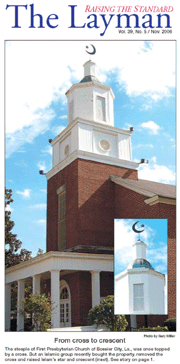 Two PCUSA churches in Louisiana merged, according to the Layman, and sold one church property to a local Islamic Association, turning down two offers from Christian churches to purchase the property. Perhaps they didn't offer as much money. The church they sold was First Presbyterian Church (Bossier City, LA), and the steeple "was once topped by a cross."
Two PCUSA churches in Louisiana merged, according to the Layman, and sold one church property to a local Islamic Association, turning down two offers from Christian churches to purchase the property. Perhaps they didn't offer as much money. The church they sold was First Presbyterian Church (Bossier City, LA), and the steeple "was once topped by a cross."




